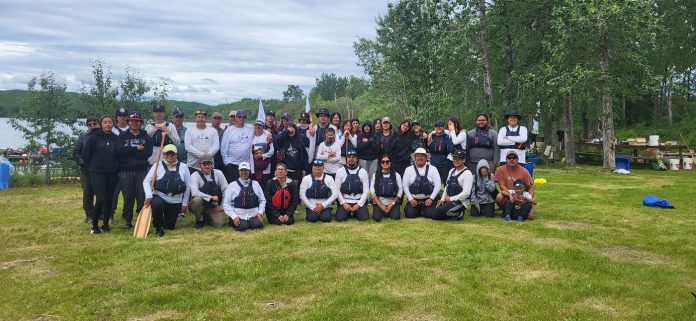NC Raine
Local Journalism Initiative Reporter
Eagle Feather News
Eight days, 187 kilometres, and 25 youth with only their arms and a little willpower they embarked on an unforgettable journey.
“It was challenging, it tested them at times,” said Andrea Custer H. Clarke, from Pelican Narrows, and Chair of the Rock Cree Language Council Inc. “But they made lifelong friendships and I’m sure it’s a trip they’ll never forget.”
Custer, and her husband Randy Clarke, led a large group of Indigenous youth on a canoe trip in northern Saskatchewan.
The trek started north of Lac La Ronge at Otter Lake, and thus began an epic, culture-infused 187 km journey through the Churchill River, ending in Pelican Narrows.
The trip was the culmination of Custer’s Masters in land-based education; a project motivated by her personal experiences growing up and learning in nature.
“I wanted youth to experience that traditional highway too,” she said. “There’s so many beautiful teachings when you travel that route, so I wanted to give the youth a sense of what our ancestors experienced and the lands they lived on.”
The group grew from 20 to 25 youth due to the large number of applicants, after Custer received more than 40 applications to attend the trip. The 25 youth, many of whom did not know each other prior to the trip, were aged 14 to 22, and assembled from communities across Saskatchewan including Peter Ballentyne Cree Nation, Deschambault Lake, Sandy Bay, and Pelican Narrows.
“Some of the kids had never done anything like this before,” said Custer. “Sometimes it was really challenging but at the end of the day they were always happy and excited when we got to camp, and enthusiastic to star the next day,”
Along their trip, they visited traditional camps, families in the area, heard stories and history, and saw ancient rock paintings. Custer also made a point of teaching language during the long hours paddling on the water.
“I told them what life was like for our ancestors, how they had no boats or connection to the outside world,” said Custer. “The kids got a strong sense of how strong they (themselves) were, because they could do it too. They got a stronger sense of pride in who they are.”
During the mornings around camp, the youth also had conversations about contemporary issues in their home communities, said Randy Clarke.
With a background in education, politics, and land-based teaching, he took the opportunity to give the young minds positive reenforcement.
“There’s a high use of crystal meth and drugs in our communities. So we had circles every morning,” said Clarke. “We explained to the youth that if you work had, if you have obstacles, keep working and you’ll achieve it. We made sure to compliment all their hard work every morning.”
Several long portages (areas in which canoers must carry their canoes and supplies through the bush to the next lake or river) were among the most challenging aspects of the journey. But the great obstacles meant an even greater reward at the end, said Clarke.
“Some of them cried at the end when we got back.” he said. “They were so happy to have this experience. They all bonded through going through something hard together.”
Clarke believes the trip will have a significant and lasting impact on the youth. He hopes more communities and organizations around the province will see the value in investing in these sort of excursions.
“We’ve had so many sad stories, stories of shootings in the community. Hopefully in the future, bands are inspired and bring more money for the youth. It’s a great experience for them,” said Clarke.
“I think this can help with drug and alcohol issues. It gets them out, it keeps them busy, and shows them the benefits of hard work. It’s never a bad thing to teach the value of hard work.”


